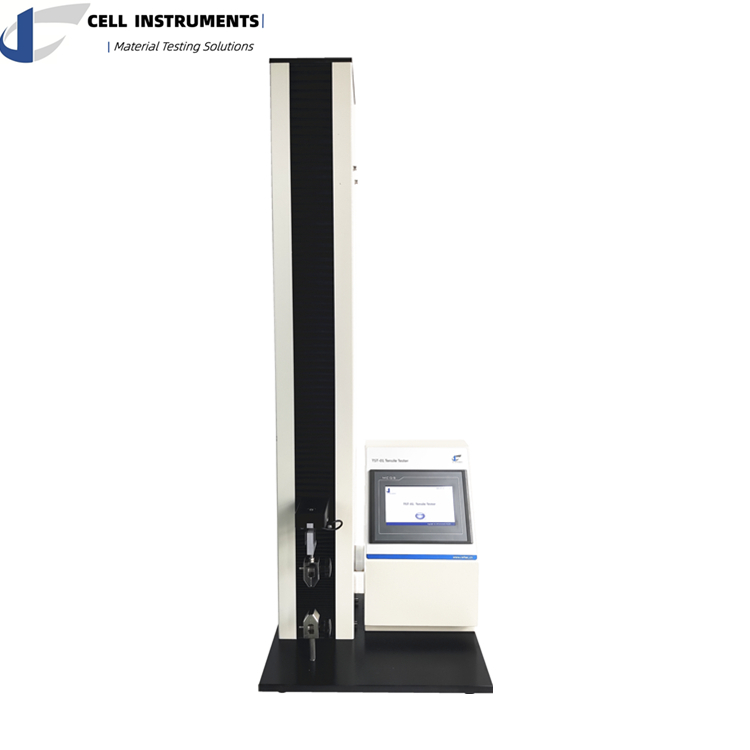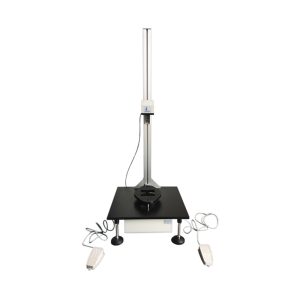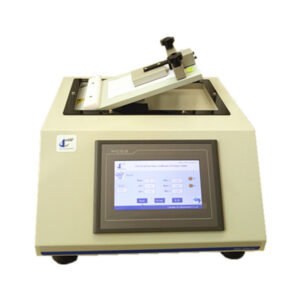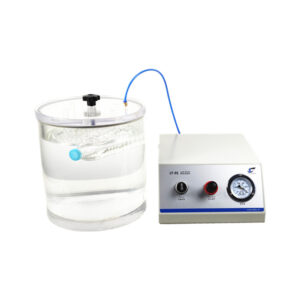1. Introduction of Tensile Strength Testing Machine
The ASTM D882 Tensile Strength Testing Machine is a specialized instrument engineered to measure the tensile properties of thin plastic films and sheeting. It plays a vital role in ensuring the quality and reliability of products across various industries, including packaging, plastics, and medical devices. This tensile tester is specifically designed to evaluate the strength and elongation of materials, making it an indispensable tool for manufacturers seeking to improve their products’ durability and performance.
By adhering to the ASTM D882 standard, this machine provides accurate and reliable data on a material’s tensile strength, yield strength, elongation at break, and modulus of elasticity. These parameters are critical for industries that rely on flexible plastic films and sheets for their products.
Main Parameter
| Test Range | 0-500N (or 50N, 100N, 200N, etc) |
| Stroke | 800mm (customizable for other strokes) |
| Test Speed | 1~500mm/min |
| Displacement Accuracy | 0.01mm |
| Accuracy | 0.5% Full Scale |
| Sample Width | 27mm (optional width available) |
| Control | PLC and HMI Screen |
| Data Output | Microprinter (optional), RS232 (optional) |
Manufacturer and Specialization
Cell Instruments is a leading manufacturer of materials testing instruments, known for its dedication to producing high-quality, precise equipment. Specializing in customization and automation transformation, Cell Instruments serves various industries, including packaging, medical, textiles, plastics, and electronics. With our focus on testing solutions, we ensure that our machines not only meet industry standards but also provide advanced functionality to meet the evolving needs of manufacturers.

2. What is ASTM D882?
Definition and Purpose
ASTM D882 is the standard test method used to determine the tensile properties of thin plastic films and sheeting with a thickness of less than 1.0 mm. The test is essential for evaluating the strength, flexibility, and durability of plastic materials, which are widely used in packaging, medical, and adhesive applications.
The tensile strength test measures how much stress the material can endure before it breaks, while the elongation at break parameter reveals how much the material stretches before failing. The modulus of elasticity gives an indication of the stiffness of the material. These measurements are critical in quality control and product development to ensure that materials meet performance expectations.
Scope of Application
The ASTM D882 standard is widely applicable in industries that use flexible plastic films and sheeting, including:
- Packaging: Ensuring that films can withstand stress during shipping and handling.
- Medical: Evaluating films used in medical packaging to ensure sterility and durability.
- Adhesives: Measuring tensile properties for products like tapes and laminates.
- Plastics and Food industries: Ensuring product integrity in packaging and storage.
3. Key Features of the ASTM D882 Tensile Strength Testing Machine
The Tensile Strength Testing Machine is packed with features that enhance its usability and accuracy:
- 7-inch HMI Touch Screen: The intuitive interface allows for easy operation and precise control over testing parameters.
- PLC Control System: Ensures efficient, stable, and reliable test operations.
- Precision Ball Lead Screw: Provides accurate and consistent results during the tensile strength test.
- Adjustable Test Speed: Enables users to customize the test speed to meet specific material requirements.
- Compatibility with Multiple Fixtures: The machine can be fitted with different grips and fixtures, making it versatile for various material types.
- Limiting Device and Automatic Returning Function: These features help protect the specimen and machine during testing, while also streamlining the operation.
- Optional Microprinter: Users can opt to include a microprinter for instant test result printing.
These features make the machine an ideal choice for manufacturers looking to perform consistent, reliable tensile strength testing.
4. Test Methods of ASTM D882
Test Procedure Overview
The ASTM D882 tensile strength test follows a standard procedure to ensure consistent results. Here’s an outline of the key steps:
- Specimen Preparation: Thin plastic films are cut to a specific size as per ASTM D882 standards. Typically, the specimen is 25 mm wide and long enough to ensure accurate measurements.
- Mounting the Specimen: The prepared specimen is mounted between two grips of the tensile tester, with one grip fixed and the other moving at a controlled speed.
- Applying Force: The machine applies a uniaxial tensile force until the specimen fails. During this process, it records the tensile strength, elongation, yield strength, and modulus of elasticity.
Measurement Parameters
- Tensile Strength: The maximum stress a material can withstand before it breaks.
- Yield Strength: The stress at which a material begins to deform plastically.
- Elongation at Break: The amount of strain (stretch) the material undergoes before breaking.
- Modulus of Elasticity: This value represents the stiffness of the material, calculated by dividing the stress by the strain in the elastic region of the stress-strain curve.
5. Description of Plastic Tensile Strength Test in ASTM D882
Purpose of Plastic Tensile Testing
Tensile strength testing is crucial for plastic materials because it provides insights into how the material will perform under stress. In industries like packaging, where plastic films are used to protect products, understanding the tensile properties helps manufacturers ensure that the material will not fail during use.
Significance of ASTM D882 in Quality Control
The ASTM D882 standard ensures that materials meet specific strength and durability requirements. This standard is vital for manufacturers aiming to produce reliable and high-performing products. For example:
- In food packaging, tensile testing helps confirm that the plastic film can withstand the rigors of transport without tearing or losing its integrity.
- In medical devices, tensile strength testing ensures that packaging materials protect the sterile contents during shipping and storage.
Benefits of Using the ASTM D882 Tensile Strength Testing Machine
- Compliance with International Standards: Using this tensile tester ensures that manufacturers meet ASTM D882 requirements, making their products more credible and acceptable in global markets.
- Improved Product Design: By understanding material limits, manufacturers can adjust formulations to enhance the performance and durability of their products.
- Increased Efficiency: The machine’s automated features reduce manual operation time and improve the overall testing process.
6. Why Choose the D882 Tensile Strength Testing Machine from Cell Instruments?
Cell Instruments offers a robust ASTM D882 Tensile Strength Testing Machine designed to meet the highest industry standards. With precise measurement capabilities, customization options, and ease of use, this tensile tester stands out as the perfect solution for manufacturers looking to enhance their material testing processes.
To learn more about how our ASTM D882 Tensile Strength Testing Machine can support your production process, or to inquire about customization options, please contact us today.
FAQ
- What types of materials can the Tensile Strength Testing Machine test?
The machine is designed to test thin plastic films and sheeting, typically with a thickness less than 1.0 mm. - How does ASTM D882 differ from other tensile strength standards?
ASTM D882 focuses specifically on thin plastic films, whereas other standards may apply to different types of materials, such as metals or thicker plastics. - Why is tensile strength testing important for packaging materials?
Tensile strength testing ensures that packaging materials can withstand the stresses they encounter during shipping and handling without breaking. - Can the machine be customized for specific testing requirements?
Yes, Cell Instruments offers customization options to meet the unique testing needs of various industries. - What additional features are available with this machine?
Optional features include a microprinter for immediate result printing and compatibility with multiple fixtures for versatile testing.
Related Articles





